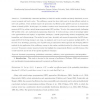Free Online Productivity Tools
i2Speak
i2Symbol
i2OCR
iTex2Img
iWeb2Print
iWeb2Shot
i2Type
iPdf2Split
iPdf2Merge
i2Bopomofo
i2Arabic
i2Style
i2Image
i2PDF
iLatex2Rtf
Sci2ools
EOR
2010
2010
Mathematical programming approaches for generating p-efficient points
Abstract: Probabilistically constrained problems, in which the random variables are finitely distributed, are nonconvex in general and hard to solve. The p-efficiency concept has been widely used to develop efficient methods to solve such problems. Those methods require the generation of p-efficient points (pLEPs) and use an enumeration scheme to identify pLEPs. In this paper, we consider a random vector characterized by a finite set of scenarios and generate pLEPs by solving a mixed-integer programming (MIP) problem. We solve this computationally challenging MIP problem with a new mathematical programming framework. It involves solving a series of increasingly tighter outer approximations and employs, as algorithmic techniques, a bundle preprocessing method, strengthening valid inequalities, and a fixing strategy. The method is exact (resp., heuristic) and ensures the generation of pLEPs (resp., quasi pLEPs) if the fixing strategy is not (resp., is) employed, and it can be used to gen...
Related Content
| Added | 10 Dec 2010 |
| Updated | 10 Dec 2010 |
| Type | Journal |
| Year | 2010 |
| Where | EOR |
| Authors | Miguel A. Lejeune, Nilay Noyan |
Comments (0)

